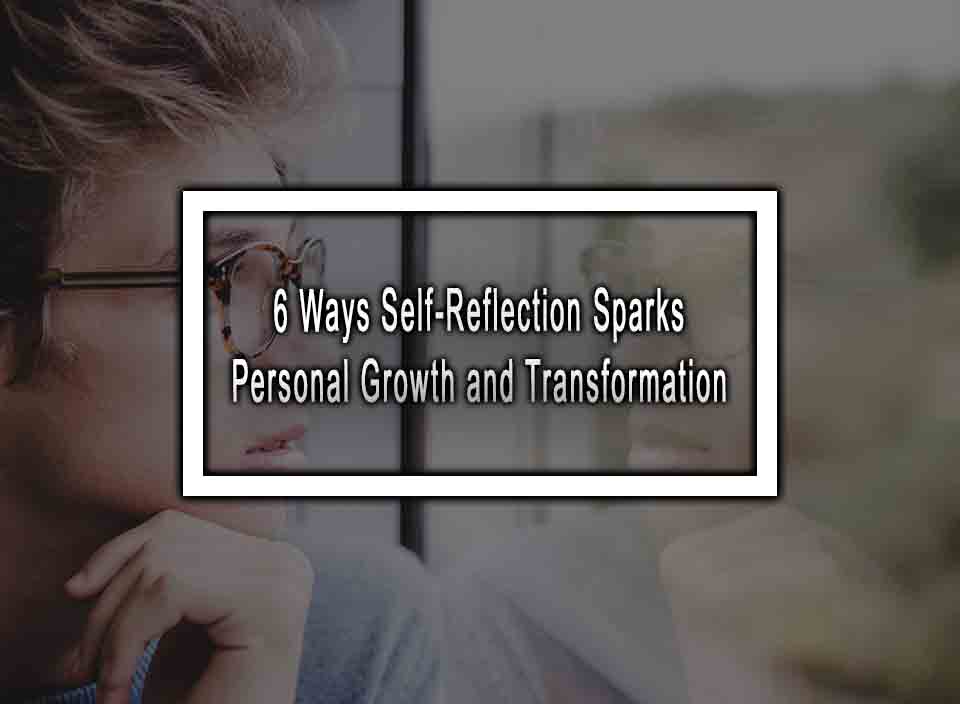Table of Contents
ToggleSelf-Reflection Can Transform Your Life and Boost Personal Growth
Are you ready to embark on a journey of self-discovery and personal growth? Look no further! In this engaging listicle, we’ve compiled seven incredible ways self-reflection can positively impact your life. From gaining clarity to fostering self-awareness, prepare to unleash your full potential and embark on a fulfilling journey toward personal development.
1. Gain Clarity and Direction through Self-Reflection
Our lives can sometimes feel like a blur, leaving us uncertain of our true aspirations and goals. Self-reflection serves as a valuable tool to gain clarity and understanding about what truly matters to us. By setting aside time for introspection, we can identify our passions, values, and potential paths to success. Embrace the transformative power of self-reflection and pave your way toward a purpose-driven life.
2. Enhance Self-Awareness through Introspection
Self-awareness is the foundation upon which personal growth is built. By engaging in self-reflection, you can delve deep into your thoughts, emotions, and behavior patterns. Recognizing your strengths enables you to leverage them while acknowledging weaknesses empowers you to address them. With enhanced self-awareness, you can make conscious choices that align with your true self, leading to a more fulfilling and authentic life.
3. Cultivate Emotional Intelligence by Reflecting on Your Feelings
Self-reflection provides us with an opportunity to observe, analyze, and understand our emotions. By contemplating our feelings, we can develop emotional intelligence—our ability to recognize, manage, and empathize with others’ emotions. Engaging in self-reflection helps us regulate our emotions better, leading to improved relationships, enhanced decision-making, and increased overall well-being.
4. Foster Continuous Learning through Self-Reflection
Self-reflection acts as a powerful learning tool, allowing us to draw insights from our experiences, both positive and negative. By reflecting on past accomplishments and failures, we can extract valuable lessons, identify areas for improvement, and implement necessary changes. Embracing self-reflection as a lifelong habit ensures continuous personal and professional growth, propelling us toward success and fulfillment.
5. Strengthen Resilience and Overcome Setbacks with Self-Reflection
Life presents us with inevitable obstacles and setbacks. However, self-reflection helps us view these challenges as opportunities for growth and resilience. By reflecting on our experiences, we can identify the factors that contribute to both success and failure. Armed with this understanding, we can cultivate resilience, bounce back stronger, and face future hardships with newfound confidence and determination.
6. Improve Relationships through Reflective Communication
Self-reflection significantly contributes to our interpersonal relationships. By reflecting on our communication style, listening skills, and empathy levels, we can enhance our interactions with others. Self-reflection enables us to become better active listeners, empathetic supporters, and effective communicators—nurturing healthier connections and fostering a more harmonious environment.
Conclusion
Embark on a transformative journey of personal growth and self-discovery through the power of self-reflection. By gaining clarity, enhancing self-awareness, cultivating emotional intelligence, fostering continuous learning, strengthening resilience, improving relationships, and communicating reflectively, you can unlock your full potential and lead a more fulfilling, purpose-driven life. Embrace the beauty of self-reflection, and let it illuminate your path toward a brighter future!
Self-Reflection FAQ
Here are the most common questions about self-reflection.
1. Why is self-reflection important?
Self-reflection is important because it allows individuals to develop self-awareness, identify their strengths and weaknesses, and make positive changes in their lives. It also helps in decision-making, problem-solving, and building healthy relationships.
2. How do I start practicing self-reflection?
To start practicing self-reflection, find a quiet and comfortable space where you can focus. Consider using a journal or a reflective writing app to document your thoughts. Reflect on specific situations or experiences and ask yourself questions about your thoughts, emotions, and actions during those times.
3. What are the benefits of self-reflection?
The benefits of self-reflection include increased self-awareness, improved decision-making, better emotional regulation, enhanced personal growth, and stronger relationships. It can also lead to increased happiness and fulfillment.
4. How often should I practice self-reflection?
There is no set frequency for self-reflection. Some people may benefit from daily self-reflection sessions, while others may find weekly or monthly reflections sufficient. It ultimately depends on your personal preference and the amount of time you can dedicate to the practice.











